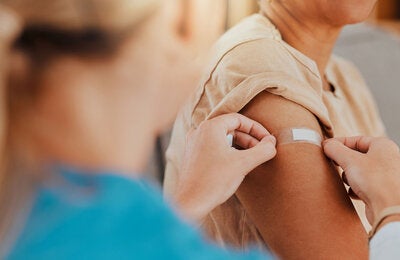Using a virtual platform promoted by PAHO/WHO, they are monitoring quality and generating alerts when faced with irregular situations or supply problems
Washington, D.C., 4 June 2013 (PAHO) - Drug regulatory agencies and ministries of health in the Americas are collaborating to strengthen drug safety and management in the Region, by exchanging information on irregularities in the manufacture of drugs and biologicals, as well as potential supply problems, in just one of the initiatives launched with support from the Pan American Health Organization / World Health Organization (PAHO/WHO).
With this objective in mind, the countries are now using a virtual tool called the Regional Platform on Access and Innovation for Health Technologies (PRAIS in Spanish), which PAHO/WHO launched last May and which already has more than 800 users—among them, the regulatory authorities of the United States, Canada, and Argentina.
The objectives of this platform are to improve transparency, information flow, and cooperation among the different sectors involved in medical products and technologies in the countries of the Americas.
"This tool is part of a series of activities that will make it possible for our Region to strengthen its surveillance of the quality and safety of the medicines consumed, as well as to help us fill information gaps among the sectors involved in drug management," explained James Fitzgerald, Senior Advisor on Essential Medicines and Biologicals at PAHO/WHO. "The Organization is working with drug regulatory authorities and other stakeholders to find ways to better coordinate joint surveillance efforts in the Region," he added.
PRAIS can be used by regional health authorities; national drug regulatory authorities; and departments of science, technology, and innovation in the countries—as well as by scientists, researchers, and research institutions in general. Other users include representatives from the pharmaceutical industry and members of civil society, nongovernmental organizations, and foundations working in the areas of medicines and health technologies.
This platform will include an add-on tool that will enable drug regulatory authorities to safely share confidential inspection reports to check on good manufacturing practices in drug manufacturing facilities. This exchange will enable them to issue alerts efficiently and quickly whenever they detect any irregularity. It will also help avoid any overlap of drug monitoring efforts.
Furthermore, the Drug Surveillance Network in the Americas has a community of practice inside PRAIS that seeks to strengthen its work and stimulate drug monitoring in the Region. This community brings together experts from the countries to exchange information on the effects medicines have and what minimizes the risk of taking them.
Furthermore, a community of practice is also being organized inside PRAIS, so that regulatory authorities can discuss the actions needed at the regional level to protect people from counterfeit drugs. In addition, at the level of the health authorities, information is being shared on the incorporation of new medical technologies and preliminary evaluations concerning their utilization.
Another example of the mechanisms offered by PRAIS involves strengthening drug management. Guatemala, Honduras, and the Dominican Republic are participating in a pilot project aimed at improving drug supply systems for treating HIV/AIDS, so as to avoid any possibility of a shortage. The countries, in their efforts to implement this monitoring system with its information on antiretrovirals, are using the PRAIS regional platform.
About the Platform
PRAIS offers such virtual tools as the following:
- Communities of practice: To bring people and institutions together to work on issues of common interest and to share and generate knowledge.
- Annotated medicines list: Provides information on essential and strategic medicines that are used throughout the Region. This component will integrate information from PAHO Member States' essential medicines lists with evidence-based summaries and regulatory status within the country.
- Observatory: Provides information on the sectors and processes involved in development, production, and regulation of health technologies through the use of standardized indicators that are periodically updated.
- Repository: Facilitates access to information on governance and other key aspects of the health technology sector.
Access to the Regional Platform is free. Interested parties can register by creating a personal or institutional profile. This will enable them to create social networks and then to share information on areas of mutual interest. Networks working collaboratively can also see each other inside the Platform.
PRAIS—with navigation capabilities in Spanish, English, and Portuguese—will be integrated into the Virtual Campus for Public Health and other PAHO/WHO resources. Internal users can send and receive messages as well as search for individuals and institutions, thus promoting information exchange and encouraging cooperation in areas of common interest. It also allows for viewing and downloading scientific publications, technical reports, and other documents free of charge.



